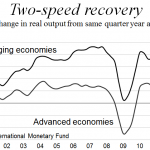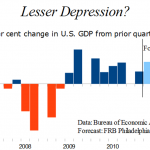The Swiss National Bank’s surprise decision Tuesday to try to prevent the Swiss franc from rising beyond SF1.20 to the Euro may well turn out to be a key miles-marker on the road to a global depression. The Swiss franc had become one of two leading refuges for investors seeking [continue reading . . . ]
I get a headache thinking about how much money Uncle Sam is borrowing — in the past year at the rate of almost $42 million a second (hat tip to the Financial Times blog Alphaville for calling this debt graphic to my attention). Think the U.S. is an outlier? Guess [continue reading . . . ]
The term “Lesser Depression” looks more appropriate by the hour. Harvard’s Kenneth Rogoff suggests another label, the Second Great Contraction (to distinguish it from the Great Depression). I’ve quoted him in Food for Thought. See his excellent essay on the op-ed of the Financial Times* on Aug. 9, 2011 The [continue reading . . . ]
The bad news is that the United States – indeed, much of the developed world – is in the midst of a “contained depression.” The private sector continues to de-leverage. Unemployment remains high. Pay for most is static or declining. Deflation remains a bigger threat than inflation. Depressions eventually end, [continue reading . . . ]
China has become enormously important to the Pacific Northwest economy. Marple’s Letter reports that China was the primary driver behind a 41% jump in Douglas Fir log exports from the Pacific Northwest last year. It is great news for timber owners — log prices are sharply higher — but bad [continue reading . . . ]

It has been nearly four years since the collapse of two Bear Stearns hedge funds (June 2007) signaled the start of the global financial crisis, not quite three since the failure of Lehman Brothers Holdings (Sept. 14, 2008) sent banks into a panic and pushed the tottering global economy off [continue reading . . . ]

What to call the period that arguably began in 2006 when the rich world’s housing market peaked? The Financial Times (FT) in a Lex column May 13 uses a term I have not seen before: “Lesser Depression.” The U.S. economy typically rebounds strongly following a recession. The 1974-75 and 1981-82 [continue reading . . . ]
So you think the dollar is washed up as a reserve currency, destined to live up to the jibe “American peso.” Better whip out your library card and retrieve the column of Mansoor Mohi-uddin, managing director of foreign-exchange strategy at UBS, on Page 22 of the Financial Times May 11, [continue reading . . . ]
I’ve said in this space before that I love newspapers. Of the four dailies I read, the one I would take to a desert island is, without question, the Financial Times. The pleasures of the salmon-colored broadsheet include such political insights as the following from Clive Crook, the newspaper’s chief [continue reading . . . ]